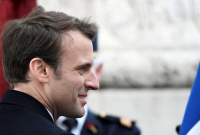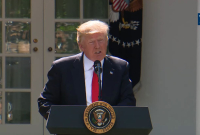Support strong Canadian climate journalism for 2025
Der Spiegel is standing by its report suggesting that Prime Minister Justin Trudeau appeased U.S. President Donald Trump by seeking removal of mention of the Paris climate agreement from a planned declaration for the G20 summit in Hamburg July 7-8.
Challenged about the report in Parliament, Trudeau ambiguously insisted that he “did not say that,” while his office wrote the German publication asking them to publish a correction.
Der Spiegel dutifully tacked a statement from Trudeau's spokesman onto the end of their story, but pointedly added its own:
“However, sources within the government in Berlin told DER SPIEGEL that the prime minister suggested to Angela Merkel to keep references to the Paris treaty out of the G-20 declaration in Hamburg. This would allow U.S. President Donald Trump to sign the planned declaration on energy.”
He said, Herr said? What’s clear is that the prime minister is very anxious to counter any public suggestion of Trump appeasement. The recent European election results suggest he will need to stand very openly against Donald Trump, or pay at the ballot box in 2019.
In case you missed it, newly-minted French President Emmanuel Macron issued an immediate and direct response to Trump's June 1 withdrawal from the Paris Agreement: "Make our planet great again."
The contrast between the recent U.K. and French elections show that appeasing Trump carries serious political risk.
Theresa May was the first national leader to visit Trump in the White House and refused to join other European countries in their condemnation when Trump announced the United States would pull out of the Paris Agreement.
Macron, by contrast, has been refreshingly undiplomatic in his response, and published a video openly inviting American scientists and engineers to move to France to pursue climate action.
Theresa May was badly wounded in the U.K. election and the voting results contain a lesson for Trudeau. Young voters — critical to the 2015 red tide that swept Canada’s Liberals to office — turned out in large numbers and overwhelmingly against May.

Young Canadian voters care a lot about climate change. They really, really, really do not like Donald Trump. And they will be the largest voting bloc in the next Canadian election.
Trudeau has been attempting a nuanced approach to U.S. relations since Donald Trump’s election, but it’s pretty clear now that there’s no getting along with the bully.
Trudeau will have to look to previous prime ministers who have charted independent paths on international issues. The Progressive Conservatives on the deployment of U.S. nuclear weapons and Organization of American States. The diplomatic recognition of China. Liberal Lester Pearson pissing on President Johnson’s rug over Vietnam. Jean Chrétien’s considered refusal to join George W. Bush in the Iraq war.
Justin Trudeau’s father had a famously bitter relationship with Richard Nixon. After tape recordings emerged of Nixon calling him an “asshole,” Trudeau replied, “I’ve been called worse things by better people.”
There is a worse president in the White House now. Canada is going to have to stand alongside the Germans, French and other nations who are clear and unambiguous in their opposition to Trump.
Continuing to assert commitment to the Paris Agreement is necessary but even stronger actions will be needed to show Canada's resolve. Half-way to the next federal election, there is still a sizeable gap between Canada’s climate policies and Paris promises. Will the government implement more ambitious action, like electric vehicle mandates and the elimination of fossil fuel subsidies?
Let's keep the scale of the climate challenge clear: the Paris Agreement is only a beginning step on the path to climate safety. Canada's environment minister has promised that our climate pollution targets would be "the floor not the ceiling." The minimum test of Canada's commitment to the Paris Agreement is living up to it.







Comments
Exactly. And while we're at it, let's not gloss over the obvious connections between the Trump administration and the Oil and Gas cartels. We can't simply blame Trudeau for being wishy-washy...we have to own up to our own preference for climate action lite....we all have to start talking, and acting, according to what we know from the science done in labs not captured by the likes of Exxon, and what we are experiencing on the ground in terms of wild weather.
We don't have decades, and we can't make climate change one more add on to our world of conspicuous consumption, wage stagnation, and dirty energy pipedreams. CLIMATE LEADERS DON'T BUILD BITUMEN PIPELINES DESIGNED TO PUMP FULL THROTTLE FOR 40 YEARS. CLIMATE LEADERS DON'T REMAIN IGNORANT OF THE AMOUNT OF FRACKING IT WILL TAKE TO DILUTE THAT GUNK FOR THOSE 40 YEARS.
And absolutely. For a small start, climate leaders do move to end fossil fuel subsidies, and institute subsidies that will bring the population on side, for electric vehicles, solar electricity, local food sheds and the reclimation of as much of our watersheds as we can still recover.
It's a big job. Someone who can stand up to Trump might be qualified to begin the work. But for my money, we turned our noses up at that leader, and voted for a pretty face and a pile of good, new age, intentions.
Young and old..........we'd better choose more wisely next time around.
How "nuanced" is ambiguity?
Time to WALK THE TALK, M. Trudeau.